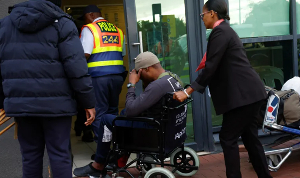Residents of Wuxor, Have, and Sremanu Electoral Areas in the Akatsi South Municipality of the Volta Region continue to struggle in their quest to have access to potable drinking water.
A visit by the newly elected Assemblymember of the area, Hon. Japhet Festus Gbede, to the river banks within the area has revealed that the residents have since been compelled to depend on polluted water fetched from a pond for domestic use and drinking, particularly those who cannot afford to buy sachet water, exposing them to serious health risks.
“This is our only source of water; we use it for washing, cooking, and drinking because not everyone can afford sachet water. But this water is heavily polluted, especially during the rainy season. It carries all sorts of contaminants, including debris and human excrement, but we have no choice but to drink it. A resident told the media.
Speaking to the media, Hon. Gbede added that the area has been grappling with an acute shortage of clean and safe drinking water for several years now, which has caused widespread health issues. Owing to the lack of access to safe drinking water, locals have no choice but to rely on contaminated sources such as ponds that are often infested with harmful bacteria and parasites.
Mr. Gbede, appealing to non-governmental organizations, stated that this situation has led to an upsurge in waterborne illnesses like cholera, typhoid fever, and dysentery among residents, particularly children and the elderly.
Additionally, women and girls must spend hours every day fetching water from far-flung locations; this not only impacts their well-being but also deprives them of educational opportunities.
Appealing to non-governmental organizations, Mr. Gbede said the situation is worrying. "Therefore, I implore your esteemed organization to take swift action towards providing a sustainable solution for the prevailing water crisis in Have-fiakpokorpe.
Your support can make a substantial difference in enhancing the livelihoods of these marginalized individuals by ensuring access to uncontaminated drinking water while promoting hygiene practices aimed at reducing disease prevalence."
He noted that the residents risk contracting waterborne diseases; “if care is not taken, waterborne disease can strike this community. The water is not hygienic.”
The residents indicated that they have never tasted or enjoyed potable water, even though they are part of the country and voted during elections.
According to them, although their only source of water gets polluted with drains from the gutters whenever it rains, they have no option but to stick to it.
Some of the women noted that, due to the nature of the polluted water, they get infected with communicable diseases such as cholera and guinea worm infestation.
They lamented that during the dry season, the stream often dries up, making life unbearable for them, especially women, during that period.
Aside from the water crisis, he noted that the road network from Sremanu junction to Have-Fiakpokorpe and Wuxor, all in the Wuxor, Have, and Sremanu Electoral Area, is in terrible condition and is serving as a death trap to commuters who use it.
Mr. Japhet Festus Gbede has therefore appealed to the government and other agencies to come to their aid to provide them with mechanized boreholes and rehabilitate the sorry nature of the road to alleviate their predicament.
He said the only permanent solution to the chronic water challenge in the area is the construction of mechanized boreholes, wells, or dams for the poor farmers.
Residents of Wuxor, Have, and Sremanu Electoral Areas in the Akatsi South Municipality of the Volta Region continue to struggle in their quest to have access to potable drinking water.
A visit by the newly elected Assemblymember of the area, Hon. Japhet Festus Gbede, to the river banks within the area has revealed that the residents have since been compelled to depend on polluted water fetched from a pond for domestic use and drinking, particularly those who cannot afford to buy sachet water, exposing them to serious health risks.
“This is our only source of water; we use it for washing, cooking, and drinking because not everyone can afford sachet water. But this water is heavily polluted, especially during the rainy season. It carries all sorts of contaminants, including debris and human excrement, but we have no choice but to drink it. A resident told the media.
Speaking to the media, Hon. Gbede added that the area has been grappling with an acute shortage of clean and safe drinking water for several years now, which has caused widespread health issues. Owing to the lack of access to safe drinking water, locals have no choice but to rely on contaminated sources such as ponds that are often infested with harmful bacteria and parasites.
Mr. Gbede, appealing to non-governmental organizations, stated that this situation has led to an upsurge in waterborne illnesses like cholera, typhoid fever, and dysentery among residents, particularly children and the elderly.
Additionally, women and girls must spend hours every day fetching water from far-flung locations; this not only impacts their well-being but also deprives them of educational opportunities.
Appealing to non-governmental organizations, Mr. Gbede said the situation is worrying. "Therefore, I implore your esteemed organization to take swift action towards providing a sustainable solution for the prevailing water crisis in Have-fiakpokorpe.
Your support can make a substantial difference in enhancing the livelihoods of these marginalized individuals by ensuring access to uncontaminated drinking water while promoting hygiene practices aimed at reducing disease prevalence."
He noted that the residents risk contracting waterborne diseases; “if care is not taken, waterborne disease can strike this community. The water is not hygienic.”
The residents indicated that they have never tasted or enjoyed potable water, even though they are part of the country and voted during elections.
According to them, although their only source of water gets polluted with drains from the gutters whenever it rains, they have no option but to stick to it.
Some of the women noted that, due to the nature of the polluted water, they get infected with communicable diseases such as cholera and guinea worm infestation.
They lamented that during the dry season, the stream often dries up, making life unbearable for them, especially women, during that period.
Aside from the water crisis, he noted that the road network from Sremanu junction to Have-Fiakpokorpe and Wuxor, all in the Wuxor, Have, and Sremanu Electoral Area, is in terrible condition and is serving as a death trap to commuters who use it.
Mr. Japhet Festus Gbede has therefore appealed to the government and other agencies to come to their aid to provide them with mechanized boreholes and rehabilitate the sorry nature of the road to alleviate their predicament.
He said the only permanent solution to the chronic water challenge in the area is the construction of mechanized boreholes, wells, or dams for the poor farmers.
Regional News of Friday, 5 January 2024
Source: JAPHET 1 Tv
Waterborne diseases, lack of basic amenities affecting livelihoods in my area - Assembly Member cries
Entertainment












